Ministry of Communications
Union Minister Shri Jyotiraditya M. Scindia addresses press conference to share important decisions and achievements taken by the Department of Telecommunications in the 100 days of the third term of Prime Minister Shri Narendra Modi.
Shri JyotiradityaScindia says “Initiatives aims to ensure that digital and infrastructural links are ubiquitous, facilitating access to essential services and opportunities to all.”
These initiatives reaffirm to expanding and enhancing India’s Telecom ecosystem, for a more digitally empowered future
DoT’s initiative,'Ek Ped MaaKe Naam' App also gets launched, combining environmental responsibility with a personal touch
प्रविष्टि तिथि:
23 SEP 2024 5:53PM by PIB Delhi
The Minister of Communications (Department of Telecom & Department of Post) and Development of Northeastern Region (DONER), Shri Jyotiraditya M Scindia today said that Prime Minister Shri Narendra Modi's governmenthas prioritized connectivity for every citizen across the nation. He said, the initiatives of Department of Telecommunications aim to ensure that digital and infrastructural links are ubiquitous, facilitating access to essential services and opportunities. He emphasized that maintaining this connectivity is crucial for fostering inclusive growth and development throughout India.
Shri Jyotiraditya M Scindia along with Minister of State for Communications and Rural Development, Dr. Pemmasani Chandra Sekharwas addressing the media on achievements of the Ministry of Communications (DoT& DoP) and Ministry of Development of Northeastern Region (DONER)in 100 days of the Government in New Delhi. Secretary (T), Secretary (DoP), Secretary DONER and senior officials of the ministries were present.
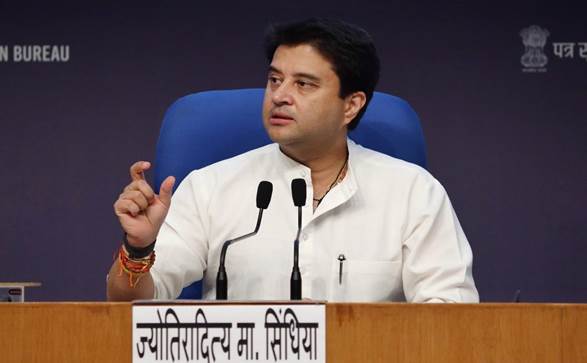
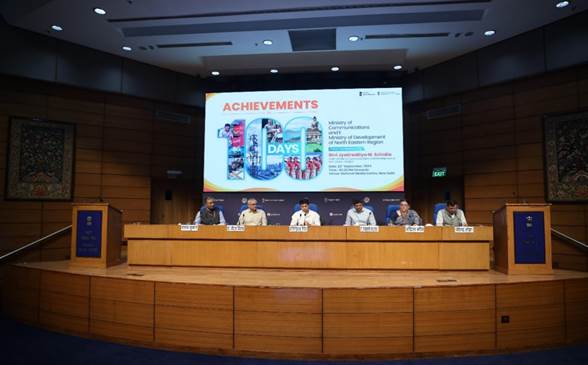
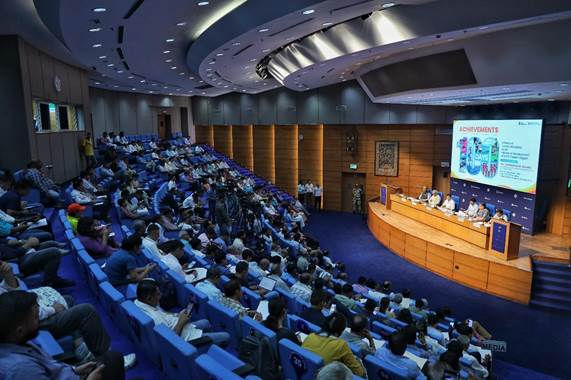
Shri JyotiradityaScindia also launched 'Ek Ped Maa Ke Naam(EPKMN) App, a uniqueinitiative of DoT, where citizens can plant a tree in honour of their mother and record the location, latitude, longitude, and timestamp of the dedicated tree.The app allows them to update the tree’s growth by uploading a new image every 30 days, allowing for continuous tracking.(The android application can be downloaded from https://usof.gov.in/en/ek-ped-maa-ke-naam).
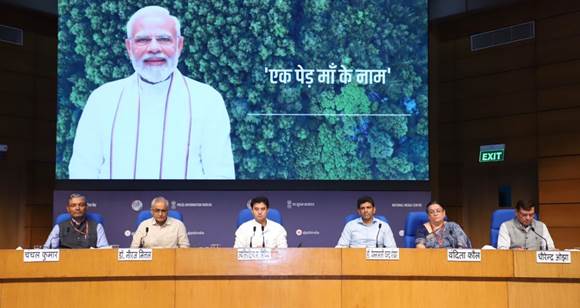
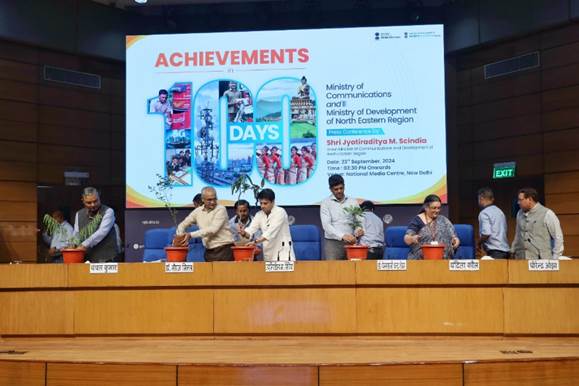
Highlighting the accomplishments of the Department of Communications during the first 100 days of the government, Minister Scindia gave a detailed outline of the work done. He pointed out that DoT has successfully completed several key initiatives as part of the Government of India's 100-day programme. He said, during this period, DoT has made significant strides in strengthening the four goals of a developed telecom ecosystem - Samaveshit (ubiquitous connectivity fuelling inclusive growth), Viksit (developed India through triad of perform, reform and transform), Tvarit (accelerated development and swift resolution), and Surakshit (safely and securely). The major achievements of 100-day programme are:
Samaveshit
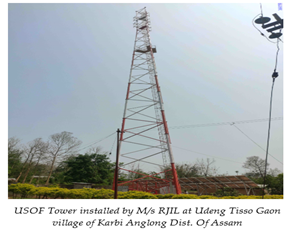 Under various initiatives funded by the Digital Bharat Nidhi (Erstwhile Universal Service Obligation Fund (USOF)), 4G mobile coverage is being expanded to uncovered villages across India. These efforts are focused on regions such as aspirational districts, the North-Eastern region, border areas, islands, and areas affected by left-wing extremism. A total of 7,101 4G mobile towers have been commissioned by Telecom Service Providers (Reliance Jio, Bharti Airtel & BSNL) under various Digital Bharat Nidhi funded 4G schemes including 4G Saturation scheme. Out of these 4G towers 2,618Towers have been made on-air since June 2024.
Under various initiatives funded by the Digital Bharat Nidhi (Erstwhile Universal Service Obligation Fund (USOF)), 4G mobile coverage is being expanded to uncovered villages across India. These efforts are focused on regions such as aspirational districts, the North-Eastern region, border areas, islands, and areas affected by left-wing extremism. A total of 7,101 4G mobile towers have been commissioned by Telecom Service Providers (Reliance Jio, Bharti Airtel & BSNL) under various Digital Bharat Nidhi funded 4G schemes including 4G Saturation scheme. Out of these 4G towers 2,618Towers have been made on-air since June 2024.
5G technology has reached almost all districts of India. As of today, 98% districts in India have presence of 5G technology thereby empowering citizens with highspeed data network. 5G networks have been rolled out in all States/ UTs across the country and more than 4.5 lakh 5G Base Transceiver Stations (BTSs) have been installed across the country.
Viksit
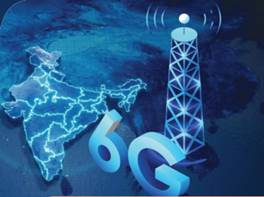 Hon'ble Prime Minister Shri Narendra Modi launched the Bharat 6G Vision in March 2023 with the objective to be a front-line contributor in design, development and deployment of 6G technology by 2030. In line with the Bharat 6G Vision and to support India's prominence in 6G technology and develop the 6G RAN for the world, the DoT invited proposals from academia, industry, and other bodies engaged in R&D. So far 111 project proposalshave been processed for funding to expedite the research under "Accelerated research on 6G Ecosystem".
Hon'ble Prime Minister Shri Narendra Modi launched the Bharat 6G Vision in March 2023 with the objective to be a front-line contributor in design, development and deployment of 6G technology by 2030. In line with the Bharat 6G Vision and to support India's prominence in 6G technology and develop the 6G RAN for the world, the DoT invited proposals from academia, industry, and other bodies engaged in R&D. So far 111 project proposalshave been processed for funding to expedite the research under "Accelerated research on 6G Ecosystem".
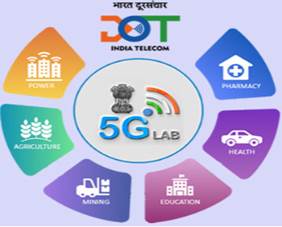 Labs with indigenously developed 5G technology are being set up at 100 institutions, equally distributed across four zones in the country. The labs are being set up with the aim of capacity building in new telecom technologies and creating use cases in various socio-economic sectors for 5G technologies in collaboration with academia and start-ups. From June 2024 onwards, 41 out of the total 100 labs have been installed making the cumulatively installed labs to 81.
Labs with indigenously developed 5G technology are being set up at 100 institutions, equally distributed across four zones in the country. The labs are being set up with the aim of capacity building in new telecom technologies and creating use cases in various socio-economic sectors for 5G technologies in collaboration with academia and start-ups. From June 2024 onwards, 41 out of the total 100 labs have been installed making the cumulatively installed labs to 81.
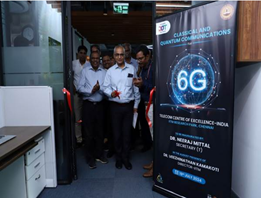 A Centre of Excellence (CoE) on “Classical and Quantum Communications for 6G” has been established at IIT Madras.Another MoU has been signed between the Telecom Centre of Excellence (TCOE) India and Visvesvaraya Technological University (VTU) – Visvesvaraya Research & Innovation Foundation (VRIF) to establish a Centre of Excellence (CoE) in Quantum Technology, focusing on associated 5G/6G technologies. TheseCoE will serve as a hub for innovation bringing together industry and academic experts to collaborate on cutting edge project in advance telecommunication technologies to foster and spearhead the development and deployment of 6G technology
A Centre of Excellence (CoE) on “Classical and Quantum Communications for 6G” has been established at IIT Madras.Another MoU has been signed between the Telecom Centre of Excellence (TCOE) India and Visvesvaraya Technological University (VTU) – Visvesvaraya Research & Innovation Foundation (VRIF) to establish a Centre of Excellence (CoE) in Quantum Technology, focusing on associated 5G/6G technologies. TheseCoE will serve as a hub for innovation bringing together industry and academic experts to collaborate on cutting edge project in advance telecommunication technologies to foster and spearhead the development and deployment of 6G technology
A MoU has been signed between TCoE India and National Forensic Sciences University (NFSU) Gandhinagar for setting up of Centre of Excellence on Telecom Security. The MoU envisages strengthening the National cyberspace by securing the Telecom network and to develop an Indian telecom network security stack to enhance security of the nation's communication infrastructure.
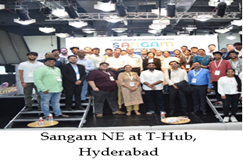
 Sangam Digital Twin with AI Driven Insights:Digital Twin with AI-Driven Insights is an initiative to revolutionize infrastructure planning. This two-stage initiative began with a creative exploration phase designed to build confidence among participants through networking events.Over 150 organizations and experts participated in Stage-I in the form of networking events held in July 2024, demonstrating a willingness and foundational capability to develop the envisioned ecosystem for advanced infrastructure planning.In the Stage-II of Sangam development and demonstration of specific use cases are being planned.
Sangam Digital Twin with AI Driven Insights:Digital Twin with AI-Driven Insights is an initiative to revolutionize infrastructure planning. This two-stage initiative began with a creative exploration phase designed to build confidence among participants through networking events.Over 150 organizations and experts participated in Stage-I in the form of networking events held in July 2024, demonstrating a willingness and foundational capability to develop the envisioned ecosystem for advanced infrastructure planning.In the Stage-II of Sangam development and demonstration of specific use cases are being planned.
PoC of Metro route planning: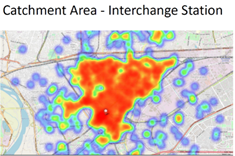
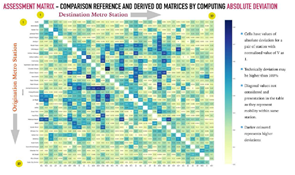 DoT, Delhi Metro Rail Corporation (DMRC) and Telecom Service Providers (TSPs) have successfully conducted a Proof of Concept (PoC) to demonstrate the feasibility of using aggregated telecom data for metro route planning addressing privacy challenges. PoC explored solution’s flexibility to evolve and tackle ridership issues in ongoing metro projects by accurately identifying catchment areas, analysing arrival times, assessing interchange durations, utilization optimize operations, generating an Origin-Destination (OD) matrix for metro network planning and improving ongoing operational strategies. The promising results achieved endorse the Sangam Digital Twin initiative and represent a significant first step.
DoT, Delhi Metro Rail Corporation (DMRC) and Telecom Service Providers (TSPs) have successfully conducted a Proof of Concept (PoC) to demonstrate the feasibility of using aggregated telecom data for metro route planning addressing privacy challenges. PoC explored solution’s flexibility to evolve and tackle ridership issues in ongoing metro projects by accurately identifying catchment areas, analysing arrival times, assessing interchange durations, utilization optimize operations, generating an Origin-Destination (OD) matrix for metro network planning and improving ongoing operational strategies. The promising results achieved endorse the Sangam Digital Twin initiative and represent a significant first step.
To boost domestic manufacturing, investments and export in the telecom and networking products PLI scheme with a financial outlay of ₹ 12,195 Crores over a period of 5 years has been initiated. So far, 42 PLI beneficiary companies, collectively invested Rs. 3,718 crores achieved sales of Rs. 57,498 crore including export of Rs. 11,506 crores and direct employment of 22,315.
Tvarit
MSME Certification assistance scheme:DoTlaunched reimbursement scheme aimed at easing financial burdens for startups and Micro & Small Enterprises (MSEs) in the telecom sector. With the objective of fostering domestic manufacturing, attracting investments and enhancing exports, the scheme will reimburse up to INR 50 lakhs per startup or MSE for testing and certification costs essential for product quality and market access.
With an objective of improving the telecom network performance, benchmarks will be gradually tightened for key network parameters like network availability, call drop rates, packet drop rates, etc. In this regard, TRAI has released its revised regulations, “The Standards of Quality of Service of Access (Wirelines and Wireless) and Broadband (Wireline and Wireless) Service Regulations, 2024 (06 of 2024)’.
To update the existing laws and to address the challenges of the Telecom sector, Central Government enacted Telecommunications Act, 2023 on 24th Dec 2023. The Act replaces colonial era’s Indian Telegraph Act, 1885 and Indian Wireless Telegraphy Act, 1933. Enforcement of its provisions and rules will enable effective and modern regulation of Telecom sector. It will provide clearly defined framework for Spectrum assignment and its optimal utilization, Effective and efficient RoW framework, Strong provisions for National Security and Public emergency, etc
In accordance with section 1(3), the Central Government has on 21.06.2024 issued Gazette Notification enforcing sections 1,2, 10 to 30, 42 to 44, 46, 47, 50 to 58, 61 and 62 of the Telecommunications Act w.e.f. 26.06.2024. The Department has also, on 04.07.2024, notified sections 6 to 8, 48 and 59(b) of the Act w.e.f. 05.07.2024.
Draft Rules for Security related provisions have been published for public consultation. Public consultation on draft rules for Adjudication, Amateur Station Operator and Commercial Radio Operator’s Certificate of Proficiency to operate Global Maritime Distress and Safety System has been completed. Two set of rules i.e. Telecommunications (Administration of Digital Bharat Nidhi) Rules, 2024 and Telecommunications (Right of Way) Rules, 2024 have come into force through gazette notification dated 31.08.2024 and 18.09.2024 respectively.
Spectrum Auction in 800 MHz, 900 MHz, 1800 MHz, 2100 MHz, 2500 MHz, 3300 MHz and 26 GHz bands was held in June 2024. A total of 141.4 MHz of spectrum in the 900 MHz, 1800 MHz, 2100 MHz and 2500 MHz bands were sold at a market determined price of Rs. 11340.78 crores.
Surakshit
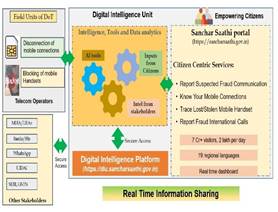 DoThas developed an online secure Digital Intelligence Platform (DIP) under Digital Intelligence Unit (DIU) Project for sharing information related to misuse of telecom resources among the stakeholders on near real time basis for prevention of cyber-crime and financial frauds. Different stakeholders are being onboarded on it including Ministry of Home Affairs (MHA), law enforcement agencies, RBI, banks, financial institutions (FIs), GSTN, UIDAI and social media platforms. 32 States/UTs police, Securities Exchange Board of India (SEBI), National Payment Corporation of India (NPCI) have on boarded this platform during Jul-Aug 2024.
DoThas developed an online secure Digital Intelligence Platform (DIP) under Digital Intelligence Unit (DIU) Project for sharing information related to misuse of telecom resources among the stakeholders on near real time basis for prevention of cyber-crime and financial frauds. Different stakeholders are being onboarded on it including Ministry of Home Affairs (MHA), law enforcement agencies, RBI, banks, financial institutions (FIs), GSTN, UIDAI and social media platforms. 32 States/UTs police, Securities Exchange Board of India (SEBI), National Payment Corporation of India (NPCI) have on boarded this platform during Jul-Aug 2024.
Till date 750 users of various stakeholders have on boarded on DIP. These stakeholders include field units of Department of Telecommunications (DoT), telecom service providers (TSPs), MHA, Indian Cybercrime coordination centre (I4C), National Intelligence Agency (NIA), 32 States/UTs police, 460 banks, FIs, fintechs, Financial Intelligence Unit (FIU), SEBI, GSTN, IRCTC and social media platforms
The Department of Telecommunications, through these 100 days achievements, reaffirm to expanding and enhancing India’s telecom infrastructure, ensuring seamless connectivity, promoting digital inclusion, fostering innovation and preparing the country for a more digitally empowered future.
****
MG/PD/DP
(रिलीज़ आईडी: 2057958)
आगंतुक पटल : 2328